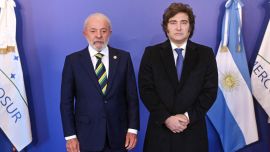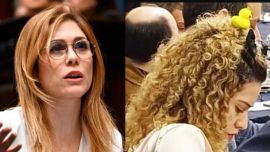After days of speculation over her future, Justice Minister Marcela Losardo has resigned her post, government sources confirmed late Tuesday.
The 62-year-old, a longtime ally of President Alberto Fernández, will accept an offer from President Alberto Fernández to take over as Argentina's ambassador to UNESCO, officials told multiple news outlets. That position was previously held by the late Fernando 'Pino' Solanas, who died in November last year.
As yet, the president has not decided who will replace Losardo leading the Justice Ministry, officials briefed. Names such as Frente de Todos national lawmakers Martín Soria and Ramiro Gutiérrez are among those known to be in the frame. The former is seen as having close ties to Kirchnerism, while the latter is part of the Frente Renovador grouping led by Lower House Speaker Serio Massa.
Lawyer Marisa Herrera, an expert in family law who serves a member of the advisory council for judicial reform, is also said to be in the frame. Justice Secretary Juan Martín Mena, a figure trusted by Vice-President Cristina Fernández de Kirchner and seemingly a likely replacement, is not thought to be among the frontrunners.
President Fernández revealed in an interview on Monday that Losardo, a friend from his university days, was on her way out. He said his ally had pleaded “exhaustion,” after a month in which the government has sharply escalated its criticisms of the judiciary and the Supreme Court.
"Marcela put it to me last week, not for the first time, that her idea was to leave the Ministry because she believes that the times ahead need a different attitude," said the president regarding the minister, his personal friend and law office partner over four decades.
"I want her to keep working with me, I don’t want her to go but she has made her decision manifest to me. It’s just a question of time and finding a replacement, I have no urgency to see her go. She’s very important to me,” insisted Fernández in an exclusive interview with C5N television news channel’s Gustavo Sylvestre.
The minister’s exit comes just a week after the president called for sweeping judicial reform in his March 1 state-of-the-nation address to open Congress.
"Judicial reform in its broadest dimension is also the demand of society in its entirety which cannot be postponed," maintained Fernández, who already last year had presented a reform bill, still awaiting debate in the Chamber of Deputies.
In his speech the President added: "We live in times of politicised justice and vice versa, which ends up damaging democracy and civic confidence because it turns everything upside down."
Three days later Vice-President Cristina Fernández de Kirchner, who heads the Senate, blasted some judges while defending herself before the Cassation Court in a trial against her.
According to Fernández de Kirchner, that trial, known as the "dollar futures case," was fabricated in order to fuel the electoral victory of the previous president Mauricio Macri in 2015.
"We’re at a very grave institutional stage in the Argentine Republic, you cannot keep behaving like a corporation," she told the judges.
Last Monday Fernández compared his vice-president’s judicial situation with that of former Brazilian president Luiz Inácio Lula da Silva, celebrating the latter’s convictions being overturned by a Brazilian Supreme Court judge.
"I spoke today with Lula, these are cases using whistleblowers where the evidence is absolutely feeble but they seek to break the opposition’s will and take them out of the [presidential] race," he highlighted.
According to Fernández, "what Brazil’s Supreme Court has done shows that lawfare exists, recognising that there was a conspiracy between judges and prosecutors."
But the president also underlined that there was "misconduct in many judges, not all of them," adding: "I believe in the rule of law and in the institutions being made to be respected. I’m not the one to throw out or appoint judges although Congress can investigate how judges function."
Fernández also re-opened fire on the prosecutor Carlos Stornelli, who had warned that he would speak to him "man to man" once he left his presidential office, saying: "This threat is meaningless because he is too discredited. Stornelli has lost much of his honesty. We have a prosecutor who accuses while being accused of a very serious crime."
Losaro’s potential continuation in the Ministry found an unlikely advocate in former Federal Planning minister Julio De Vido, mostly on account of her possible successor – the two deputies Soria (Peronist-Río Negro) and Gutiérrez (Renewal Front-Buenos Aires Province) – because the former’s sister, ex-deputy María Emilia Soria, voted to unseat him from Congress in late 2017 in a session boycotted by most of the Victory Front caucus on the grounds that he was a victim of “political persecution,” one of only six Peronist deputies to break ranks.
That President Fernández could even think of Soria as Losardo’s replacement only showed “what an immeasurably miserable creature Alberto is” in the ex-minister’s considered opinion, arguing that this betrayed the Frente de Todos leader’s anti-Kirchnerism.
Along with other corruption defendants and ultra-Kirchnerites, De Vido has long criticised Fernández for not accepting the existence of “political prisoners” in Argentina.
In the summer of 2020, Cabinet Chief Santiago Cafiero said that there were no “political prisoners” in Argentina but only “arbitrary arrests,” a distinction back by his boss but this year Fernández has been taking a much tougher stance on judicial issues, more in line with Fernández de Kirchner.
– TIMES with agencies


















Comments